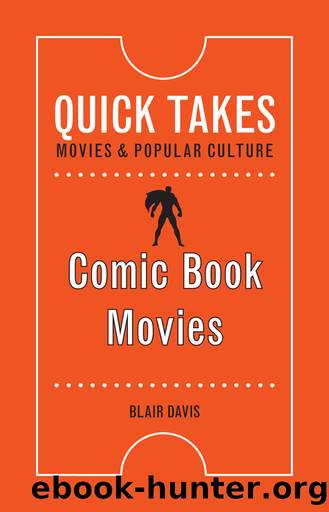Comic Book Movies by Davis Blair

Author:Davis, Blair [Davis, Blair]
Language: eng
Format: epub
Publisher: Rutgers University Press
Published: 2018-02-14T16:00:00+00:00
3
Politics
While many myths offer hope, explanation, renewal, and resolution, the political subjects and imagery in some comic book movies center around destruction, militarism, persecution, and anarchy. If myths can show us how things began, comics adaptations frequently use political themes, images, and allegories to make things fall apart. Many such films use politics (in the governmental sense) directly, as the basis of their characters or narratives. Others stand as powerful metaphors for their current political landscape. Some films are about war, others terrorism. Many portray government corruption, covert espionage, or secret organizations. While films like Superman (1978) offer viewers the optimism of an invulnerable protector, others like The Dark Knight present all-too-real accounts of armed madmen causing chaos that even the most watchful protectors cannot prevent.
Explorations of heroism and morality in comic book films are often filtered through political themes and metaphors. During World War II, the Allied forces were aided on-screen by characters like Batman and Spy Smasher. Terrorism is a prevalent concern in many of the Iron Man and Captain America films. Both V for Vendetta (2005) and The Dark Knight Rises (2012) present modern culture as marked by political unease and resistance. In Comics and Ideology, Matthew P. McAllister, Edward H. Sewell Jr., and Ian Gordon outline how comics can reflect issues of social power, asking, âhow may comics challenge and/or perpetuate power differences in society? Do comics serve to celebrate and legitimize dominant values and institutions in society, or do they critique and subvert the status quo?â (2). Comic book movies offer equally valuable case studies for how these issues are represented in popular culture.
âGLAD TO FIGHT FOR ITâ: WORLD WAR II AND THE BIRTH OF COMIC BOOK CINEMA
Comic book movies began in the early 1940s, a few years after the comic book publication format appeared on newsstands with such popular titles as Famous Funnies, More Fun Comics, Detective Comics, and Action Comics. Hollywood soon took notice, adding costumed characters to its ranks of cliffhanger serials and animated shorts (alongside those based on newspaper strips like Flash Gordon, Buck Rogers, Dick Tracy, and Popeye). In 1941, Paramount released the first of several animated adventures starring the Man of Steel with Superman, a ten-minute short in which he rescues Lois Lane from a mad scientist and his giant death ray. When the United States entered World War II following the attack on Pearl Harbor on December 7 of that year, Hollywood sought to boost morale with numerous war-themed tales in which Axis plans are thwarted and foes captured.
The results of these patriotic endeavors were often unflattering in hindsight. Their vilification of Japanese spies and saboteurs embraced abhorrent representations of racial otherness. September 1942 saw the release of Japoteurs, in which Superman captures Japanese agents who are after the worldâs largest bomber airplane. âHelp! Help! Japs are stealing the giant bomber,â says Lois via the cockpitâs microphone. The film depicts the Japanese spies as stocky, buck-toothed, and ultimately ineffectual: âOkay, little man. You win!â taunts Superman as he prepares to rescue Lois and halt the aircraftâs abduction.
Download
This site does not store any files on its server. We only index and link to content provided by other sites. Please contact the content providers to delete copyright contents if any and email us, we'll remove relevant links or contents immediately.
Warriors (9781101621189) by Young Tom(9624)
Red Rising by Pierce Brown(7326)
Dresden Files 01 - Storm Front by Jim Butcher(4534)
Enders Game 5 - Ender's Shadow by Orson Scott Card(4010)
Guilty Pleasures by Laurell K Hamilton(3586)
The Dresden Files Omnibus (1-15) by Jim Butcher(3532)
A Stormy Greek Marriage by Lynne Graham(2976)
The Heroin Diaries by Nikki Sixx(2931)
Drawing Cutting Edge Anatomy by Christopher Hart(2676)
The Boy, the Mole, the Fox and the Horse by Charlie Mackesy(2447)
Sharp Objects: A Novel by Gillian Flynn(2445)
Slugfest by Reed Tucker(2415)
Men at Arms by Terry Pratchett(2404)
The Complete Persepolis by Marjane Satrapi(2382)
The One Memory of Flora Banks by Emily Barr(2348)
The Twelve-Month Marriage Deal by Margaret Mayo(2314)
Altered Carbon (Takeshi Kovacs Novels) by Richard Morgan(2302)
The Replacement Wife by Caitlin Crews(2219)
Chris Owen - 911 by Chris Owen(2215)
